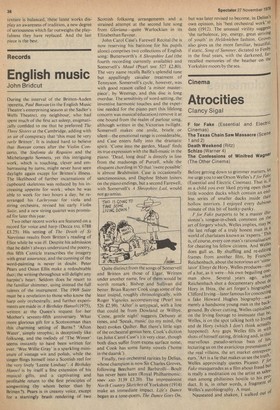Records
English music
John Bridcut
During the interval of the Britten-Auden aperetta, Paul Bun.van (in the English Music Theatre's enterprising season at the Sadler's Wells Theatre), my neighbour, who had spent much of the first act asleep, enigma( i :ally confided to me that he preferred The Three Sisters at the Cambridge, adding with an air of conspiracy that 'this must be very early Britten'. It is indeed hard to believe
that Bunyan comes after the Violin Concerto, the Sittlania c/a Requiem,' and the
Michelangelo Sonnets, yet this intriguing work, which is touching, clever and embarrassing by turns, might never have seen daylight again except for Britten's illness.
The likelihood of further incarnations of cupboard skeletons was reduced by his increasing appetite for work ; when he was able to work for two hours a day, he rearranged his Lachrytnae for viola and string orchestra, revised his early Violin Suite, and a new string quartet was promised for later this year.
Two other recent works are featured on a record for voice and harp (Decca sxt_ 6788 £3.25). His setting of The Death of St Narcissus results from Britten's reading of Eliot while he was ill. Despite his admission that he didn't always understand the poetry, this fifth Canticle transcribes the imagery with great assurance, and the cunning of the word-painting is never in doubt. Peter Pears and Osian Ellis make a redoubtable duo: the writing throughout will delight any harpist's heart. Seldom does he resort to the familiar shimmer, using instead the full talents of the instrument. The 1969 Suite must be a revelation to those who know the harp only orchestrally, and further experiments are made in A Birthday Hansel (1975), written at the Queen's request for her Mother's seventy-fifth anniversary. What more glorious gift for a Scotswoman than this charming setting of Burns? 'Afton Water', simply strophic, is deceptively like folksong, and the melody of 'The Winter' seems instantly to have been written for ever. 'Wee Willie Gray' is a sparkling miniature of vintage wit and polish, while the singer flings himself into a Scottish reel for the very lively 'Leezie Lindsay'. A Birthday Hansel is by itself a fine extension of his musical gifts, and a captivating and profitable return to the first principles of songwriting (by whom better than by Britten?). Pears is in creamy voice, except for a startingly brash rendering of two Scottish folksong arrangements and a strained attempt at the second lute song from Gloriana---quite Warlock ian in its Elizabethan flavour.
John Carol Case's Farewell Recital (he is now reserving his baritone for his pupils alone) comprises two collections of English song: Butterworth's A Shropshire Lad (the fourth recording currently available) and Somervell's Maud (Pearl SHE 527 £2.80). The very name recalls Balfe's splendid tune but appallingly cavalier treatment of Tennyson. Somervell's cycle, however, was with good reason called 'a minor masterpiece', by Westrup, and this disc is long overdue. The sensitivity of word-setting, the inventive harmonic touches and the expertise needed for the piano part (his lifelong concern was musical education) remove it at one bound from the realm of parlour song, although written in the Victorian twilight. Somervell makes one smile, bristle or silent---the emotional range is considerable, and Case enters fully into the dramatic spirit. 'Come into the garden, Maud' finds its true expression with the Ball-music in the
piano. 'Dead, long dead' is directly in line from the madsongs of Purcell, while the eloquent chording in '0 that 'twere possible' is almost Brahmsian. Case is occasionally sanctimonious, and Daphne Ibbott loiters on the piano endings, but a second Farewell, with Somervell's ,4 Shropshire Lad, would not go amiss.
Quite distinct from the songs of Somervell and Britten are those of Elgar. Written under another name, few of them would be worth remark ; Bishop and Sullivan did better. Brian Rayner Cook sings some of the least insipid, roughly chronologically, with Roger Vignoles accompanying (Pearl SHE 526 £2.99). 'After' is untypical, with a line that could be from Dowland or Wilbye. 'Come, gentle night' suggests Debussy at times, and 'Speak, music' (to my mind, the best) evokes Quilter. But there's little sign of the orchestral genius here. Cook's diction (as John Carol Case's ) is very clear, though both discs suffer from excess surface noise, and Cook has some funny vowels ('home in the daarsk').
Finally, two orchestral rarities by Delius, whose champion is now Sir Charles Groves, following Beecham and Barbirolli—Boult has never been keen (Royal Philharmonic: HMV ASE) 3139 £3.20). The impressionist North Country Sketches of Yorkshire (1914) make an immediate impact. Li/i's Dance began as a tone-poem, The Dance Goes On, but was later revised to become, in Delius's own opinion, his 'best orchestral work' to date (1912). The unusual virility suggests 'the turbulence, joy, energy, great striving of youth' in Heldettlehen fashion. Groves also gives us the more familiar, beautiful. if static, Song of Summer, dictated to FenbY in the final years, with the darkened, fa recalled memories of the heather on the Yorkshire moors by the sea.










































 Previous page
Previous page